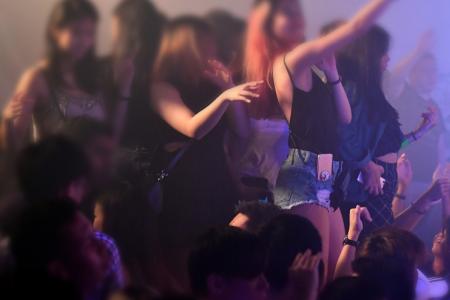Clubs can do more to stop the grab and grope
She was dancing on a podium in a club in July when a man below groped her legs and buttocks.
Cara (not her real name), a university student, tried moving away but he kept inching closer.
"I felt very violated and uncomfortable," said the 20-year-old, who added that she felt helpless at that moment. "It was hard to call for help, especially as I was alone."
She did not report the case, considering it a "minor issue".
This may be a reason that some choose not to report outrage of modesty, said experts, who added that nightspots can also do more to help prevent such incidents.
While sexual assault, including molestation, is known to be under-reported, police statistics from the first half of this year showed more reports of such crime occurring at entertainment nightspots.
There were 52 cases from January to June, up from 44 cases in the same period last year.
Overall, the number of outrage of modesty cases increased from 655 to 717 over the same period.
Meanwhile, the Sexual Assault Care Centre (SACC) run by the Association of Women for Action and Research saw 63 cases of physical sexual harassment from January to June. In this period last year, the SACC handled 38 such cases.
Experts say the increase in the number of cases is a sign that more women are coming forward, and yet it could still be the tip of the iceberg.
"Even though such behaviour is highly disrespectful and unwanted, many survivors may feel they have to minimise it or brush it off because they believe others will not support them in taking it seriously, or may even question them about their own actions," said SACC manager Anisha Joseph.
"Letting survivors know that they have legal recourse should they choose to report it, and that they need not put up with it, can go a long way towards changing attitudes."
Clinical psychologist Jeanie Chu of the Resilienz Clinic said: "More often than not, victims do not seek psychiatric or psychological treatment, or even report such cases."
They may deem the cases as "trivial", or fail to realise that their encounter could be considered an outrage of modesty.
Some, like marketing executive Phoebe (not her real name), said it can be difficult to even know who the perpetrator was.
When the 25-year-old was walking around at a beach party in Bangkok in July last year, a man grabbed her buttocks and fled.
"It happened fast and I couldn't run after him. There wasn't really any way to report it," she said. "In places like that, people can disappear into the crowd easily."
She added that while such incidents are common, patrons are also "protected" in nightspots here, with bouncers around who will intervene when there is unwanted behaviour.
Experts agreed that nightspots have an important role to play in preventing such incidents.
"Nightspots have a responsibility to ensure their premises are safe... by training security and bar staff to step in or alert management should they witness an assault," said SACC's Ms Anisha.
"Displaying posters and helpful resources that combat sexual assault can send a clear message that an establishment does not tolerate it, and empowers victims and bystanders to speak up."
Some operators said they have staff trained to monitor patrons' safety. Mr Daniel Cheng, managing director of Get Juiced, a bar and club in Clarke Quay, said they are briefed to look out for suspicious behaviour, for instance, from lone patrons lurking on its premises, or inebriated customers getting too physical with or approaching others.
They inform security to keep an eye on these people, and step in if the patrons become a nuisance.
"They are also trained to look out for high-risk victims, usually drunk women who have been separated from their friends and are alone, or those who have passed out somewhere on the premises," he added.
If there is a report of outrage of modesty, the security team is called and can confront the perpetrator or clarify the incident, he said.
He said the increase in reported cases could be due to greater awareness and a stronger wish of bringing offenders to justice instead of considering it an embarrassing and inconvenient exercise.
Shanghai Dolly managing director Gordon Foo said besides looking out for suspicious body language, club management has been working closely with the authorities since the late 2000s to put up posters warning against acts like molestation.
"Outrage of modesty cases in nightclubs are mainly due to two factors: overcrowding and over-intoxication," he said, adding that the club is careful to control its crowd size and request patrons to leave if they are too intoxicated.
The club encounters alleged molestation cases around once a month. "All staff are briefed regularly to increase vigilance for such incidents," he said.
Get The New Paper on your phone with the free TNP app. Download from the Apple App Store or Google Play Store now



